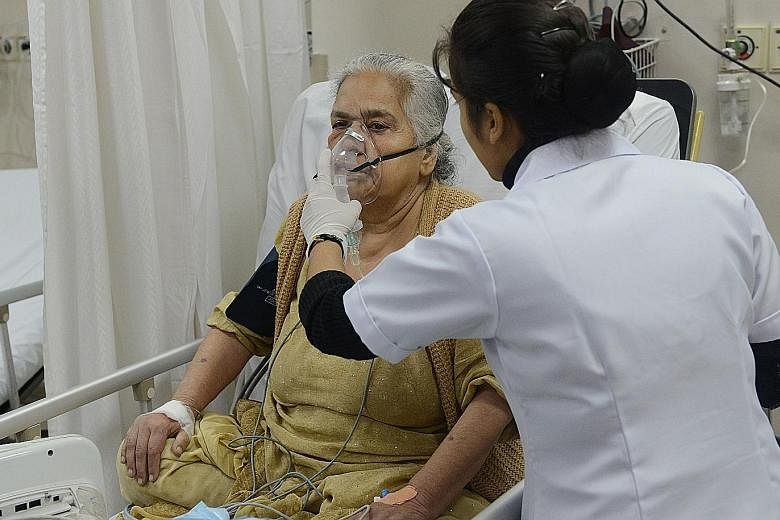NEW DELHI • Fire trucks will spray water over parts of India's capital New Delhi to combat the toxic smog and dust that have triggered a pollution emergency, even as the government plans to appeal before a green tribunal to allow exemptions within proposed curbs on private vehicles.
"Sprinkling water is the only way to bring down the dangerous pollution levels," said Ms Shruti Bhardwaj, an environmental official in charge of monitoring air quality.
The authorities will use the fire trucks in areas with high concentrations of toxic dust, said Mr Ritesh Kumar Singh, an Environment Ministry official, after a meeting of civil servants from the city government and four neighbouring states. Another ministry official who did not wish to be identified said water cannon - usually used by the police for riot control - would also be employed.
Illegal crop burning in farm states surrounding New Delhi, vehicle exhaust and swirling construction dust have contributed to what has become an annual crisis.
New Delhi's air has consistently been in the "hazardous" zone for days, despite measures such as halting construction, raising parking charges by four times, and banning commercial trucks from the city unless they are transporting essential commodities.
However, the government had to call off a plan to restrict private vehicle use after the country's top environmental court ruled that women, VIPs and two-wheelers could not be exempt.
The "odd-even" scheme, introduced temporarily last year, allows vehicles with licence plates ending in odd numbers to be used only on odd-numbered dates, and those with even numbers on even-numbered dates. The original scheme exempted VIPs - such as judges, politicians and the police - as well as female drivers, two-wheelers and emergency vehicles.
But after India's federal environmental court ruled against any exemptions - not including emergency vehicles and those running on greener compressed natural gas, or most of New Delhi's public transport - the local authorities said the scheme would be halted.
The government plans to appeal against the court's decision today.
The United States Embassy website yesterday showed levels of the smallest and most harmful airborne pollutants reached 676, about 27 times the World Health Organisation's safe maximum, after falling slightly late last week.
The poor air quality has prompted United Airlines to cancel flights to New Delhi until the air gets better. At least in United's eyes, the city's smog levels are on a par with environmental disasters to be avoided. The airline said it was letting passengers switch flights without charge or helping them find seats on other carriers. It was unclear if other airlines would follow suit.
Doctors at the government-run Vallabhbhai Patel Chest Institute in New Delhi say patient numbers have more than tripled since pollution levels spiked.
"Beginning this week, we are seeing between 250 and 300 patients, more than three times the usual," emergency ward doctor Mansi Verma said. "Most of them suffer from intense coughing and inflammation of the respiratory tract."
Despite the rise in emergency cases, Dr Arvind Kumar, a respiratory disease specialist at the private Sir Ganga Ram Hospital in New Delhi, said many of the worst health effects would not be seen for years to come.
"Pollution kills you slowly," he said. "Whatever toxin levels we are exposed to today, suppose it continued for 10 days, this would have shortened the life of each one of us by several days or several weeks.
"But that effect will be noticed many, many years later, so it's not an immediate killer. And that's why its potential lethal value is not immediately appreciated, but nonetheless, it's a lethal killer."
REUTERS, AGENCE FRANCE-PRESSE, WASHINGTON POST

